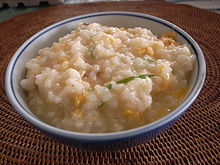Gruel

Rice gruel
|
|
| Alternative names | porridge |
|---|---|
| Type | Porridge |
| Serving temperature | Warm |
| Main ingredients | Cereal (oat, wheat or rye flour) or rice, water or milk |
| Variations | Congee |
| |
|
Gruel is a type of food consisting of some type of cereal—oat, wheat or rye flour, or rice—boiled in water or milk. It is a thinner version of porridge that may be more often drunk than eaten and may not need to be cooked. Historically, gruel has been a staple of the Western diet, especially for peasants. Gruel is often made from millet, hemp, barley or, in hard times, from chestnut flour or even the less bitter acorns of some oaks.
Though its actual medical use is not proven, the importance of gruel as a form of has historically been considered for the sick and recently weaned children. Hot malted milk is a form of gruel, although the manufacturers of such products as Ovaltine and Horlicks avoid calling it gruel, owing to the negative associations attached to the word in popular culture, as in Charles Dickens's novel Oliver Twist. From a literary, bourgeois, or modern point of view, gruel has often been associated with poverty. Gruel is also a colloquial expression for any watery or liquidy food of unknown character, e.g., pea soup. The word soup is derived from sop, the slice of bread which was soaked in broth or thin gruel.
Gruel was the staple food of the ancient Greeks, for whom roasted meats were the extraordinary feast that followed sacrifice, even among heroes, and "In practice bread was a luxury eaten only in towns". Roman plebeians "ate the staple gruel of classical times, supplemented by oil, the humbler vegetables and salt fish", for gruel could be prepared without access to the communal ovens in which bread was baked. In the Middle Ages the peasant could avoid the tithe exacted, usually in kind, for grain ground by the miller of the landowner's mill by roasting the grains to make them digestible, and grinding small portions in a mortar at home. In lieu of cooking the resulting paste on the hearthstone, it could be simmered in a cauldron with water or, luxuriously, with milk.
...
Wikipedia
